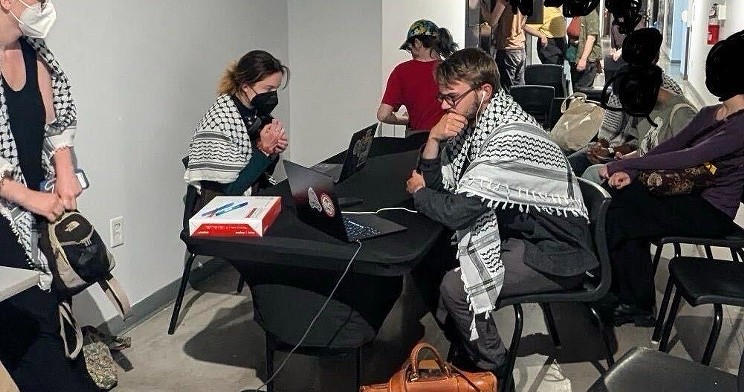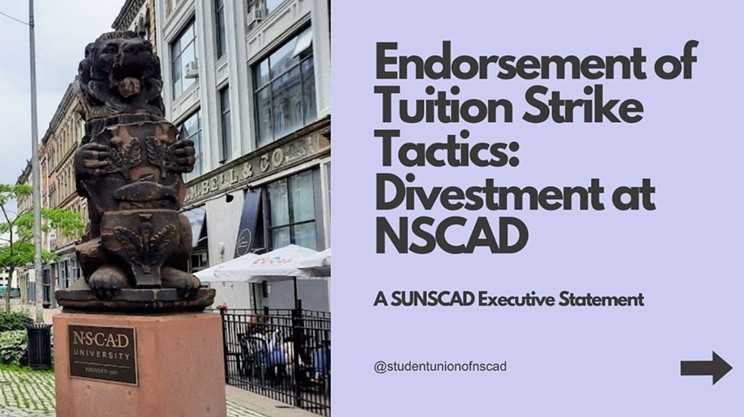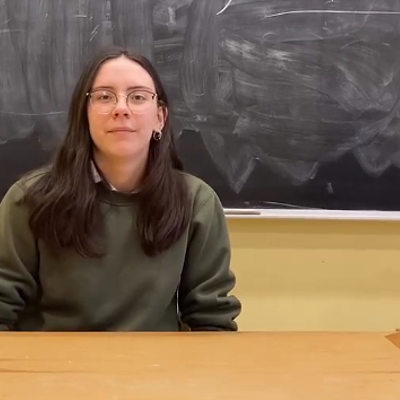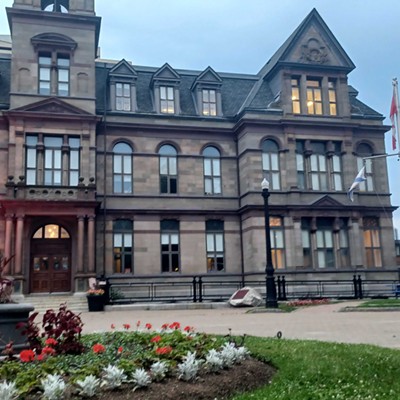On Monday July 15, the Student Union of Nova Scotia College of Art and Design (SUNSCAD) emailed all members of the union requesting their participation in a survey released the same day.
The SUNSCAD executive and council created this survey to gauge how members are feeling regarding their experience as students at NSCAD overall, such as questions on housing, food security and support needed, as well as their thoughts about demands for divestment and disclosure the student union shared on May 10 and potential actions membership could take in the fall. The survey is available for SUNSCAD members only.
Student union president Owen Skeen says this includes asking about “tuition strikes and traditional strikes both as potential actions that students can opt to be in favour of.”
Skeen says the survey is being well responded to and is hopeful for more engagement before SUNSCAD hosts an organizing meeting at the Halifax Central Library this Sunday, July 21, at 1pm.
The SUNSCAD executive’s three-part demands released on Instagram May 10 were as follows:
1. Publicly disclose the entirety of the Nova Scotia College of Art and Design University investment portfolio.
2. Immediately divest from all weapons manufacturing, military supplying, and companies operating in Israel or the occupied Palestinian territories.
3. Increase student representation on the NSCAD Board of Governors (BOG) to 50% + 1 seats.
On May 17, NSCAD president Peggy Shannon and then-interim provost Jana Macalik sent a memo to the NSCAD entitled “Response to SUNSCAD.”
They wrote that NSCAD has “a responsibility to offer informed, respectful discussion and debate,” and that “to process trauma prompted by the horrors of war, we need to pause, discuss, look at our options, understand who is impacted on all sides, listen deeply, and work together to reach a place where everyone is heard.”
Shannon and Macalik wrote that “NSCAD’s administration remains dedicated to hosting regular meetings and open communication with members of the SUNSCAD executive and that will continue throughout the next academic year.” They wrote that NSCAD hired an investment firm in 2021 that “offered an ethical approach to investment and asset management,” however they called understanding NSCAD’s investments and making informed decisions “an ongoing process.”
They wrote that NSCAD will be forming a small committee of students, faculty, administrative and staff representatives “to organize a series of discussions pertaining to war, divestment, university funding, conflict and de-escalation, peace, reconciliation, and diplomacy,” and that these conversations will happen publicly, beginning in the fall.
In an interview with The Coast on Tuesday, July 16, Skeen says “we have not had much, if any, substantial conversation with the administration regarding divestment or disclosure and they have not made any substantial effort to reach out to SUNSCAD regarding these demands, or working with us on finding the solution.”
He says, as of now, SUNSCAD is focusing their efforts on bringing these demands to the BOG through Skeen and the student union’s vice-president of finance Chelsea Stilwell, who sit in those meetings. “We, the students, have actual decision making power within that body.”
Yet, of their efforts to bring motions amplifying SUNSCAD’s demands to the BOG, Skeen says there has been “no substantial progress.”
On June 6, SUNSCAD posted a statement from their council endorsing a tuition strike for union members in the fall of 2024, “if NSCAD has not, by the beginning of the Fall 2024 semester, met the divestment demands previously released by the SUNSCAD executive.”
Currently the union executive is made up of four members who started their one-year terms on May 1: Skeen, president; Stilwell, vice-president finance; Mohammed Aadil Kallivalappil, vice-president external; and Jewell Tan, vice-president internal. The position of vice-president academic is currently vacant and will be filled in a by-election this fall.
There are currently six members on the SUNSCAD council, including the four executive members. The rest of the councillor positions will be filled after the fall by-election.
In their Instagram post, SUNSCAD council says they endorsed tuition strike action for the fall because “NSCAD has not yet disclosed the content of its investment portfolio, as a result, we cannot know the extent to which our institution is complicit in the genocide of the Indigenous people of Palestine.”
At the time of publication, NSCAD’s most recent public financial statement comes from the fiscal year ending in Mar. 31. It shows that nearly 40% of the university's revenue came from student tuition or academic fees, amounting to over $8 million, and was the second largest contributor to their revenue, behind over $9.1 million coming from government grants.
According to two surveys from the Association of Atlantic Universities (AAU), there were 726 full- time and 114 part- time undergraduate and graduate students at NSCAD as of Oct. 10, 2023.
“With the way NSCAD is organized now, on a tuition-based financial model, NSCAD needs our money to function,” wrote SUNSCAD in their post on June 6. “We will not let this power of the students go unrecognized.”
On June 11, the chair of NSCAD’s BOG, William Barker, issued a memo to the NSCAD community, entitled “Response to SUNSCAD's demands for disclosure.”
Barker’s memo acknowledges that on June 2, the BOG received what he called “a set of widely publicized demands from students in relation to the war in Gaza, with a specific request to disclose our investments and to divest of all investments related to Israel.”
He wrote that NSCAD “already has a robust investment policy that is anti-war” and mentioned, like Shannon and Macalik, that in 2021, NSCAD hired the investment firm Leith Wheeler, chosen “because of their expertise in ethical investments.”
Barker wrote that Leith Wheeler’s investment policy is supervised by NSCAD’s chief financial officer, Leanne Dowe, and that investment reports are presented to NSCAD BOG’s Finance and Physical Resource (FPR) committee twice a year.
He wrote that “public disclosure of NSCAD investments is complicated by certain proprietary aspects of Leith Wheeler’s pooled investment strategies.” However, he also said that student representatives who sit on the FPR have access to these reports.
His memo clarified that the source of NSCAD’s investments “are endowments and philanthropic donations – not tuition or our government grant,” and that these “are funds being managed for the future of the university, and to fund current gift programs.”
Barker echoed Shannon and Macalik in that “making ethical decisions about our money is an ongoing process of reflection and inquiry,” and that a subcommittee in the fall, which will operate as an extension of the BOG, will work to review NSCAD’s investments “in detail to determine what additional steps the institution can take to reflect our collective values.”
The upcoming town hall meeting on Sunday, July 21 for SUNSCAD will be closed to non-union members. “We want students to be able to speak without fear of the [NSCAD] administration knowing what they said within the meeting,” says Skeen.
Sunday’s meeting will be a chance for NSCAD students “to review the results of this survey and, in part, to ask students whether or not they're interested in pursuing a strike and of what kind.”
This will be the second in a summer series of town halls with union membership to discuss how students are feeling about the demands released in May and to talk about how these have been discussed with NSCAD administration and NSCAD’s BOG.
The first in the series happened on June 29 at the North Memorial Library. It was open to all union members and featured guest speakers who discussed ways to “ensure that demands get met within universities and within student union organizing spaces,” said Skeen in a recap video posted for SUNSCAD members on Instagram, on Monday July 15.
“We learned at this meeting that when it comes to traditional strikes, universities cannot afford to fail all of their students,” said Skeen in that post.
He also said they polled everyone in attendance on June 29, and received “overwhelming support for tuition strikes, traditional strikes and occupations” in response. These poll questions have been included into survey questions sent to all members of the union.
Skeen clarifies that SUNSCAD’s executive and council “are not legally able to endorse or directly pursue tactics around occupations or encampments.” However, he says SUNSCAD is grateful that members “felt safe enough within the town hall to discuss these things openly amongst themselves and to develop those kinds of organizational connections that will allow themselves to pursue this independently.”
gd2m-html: xyzzy Wed Jul 17 20













